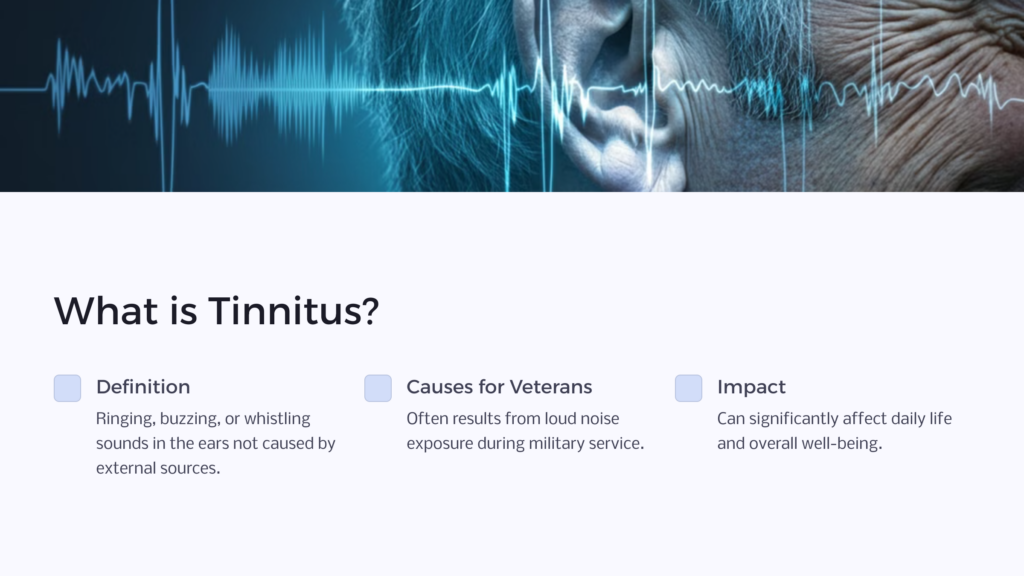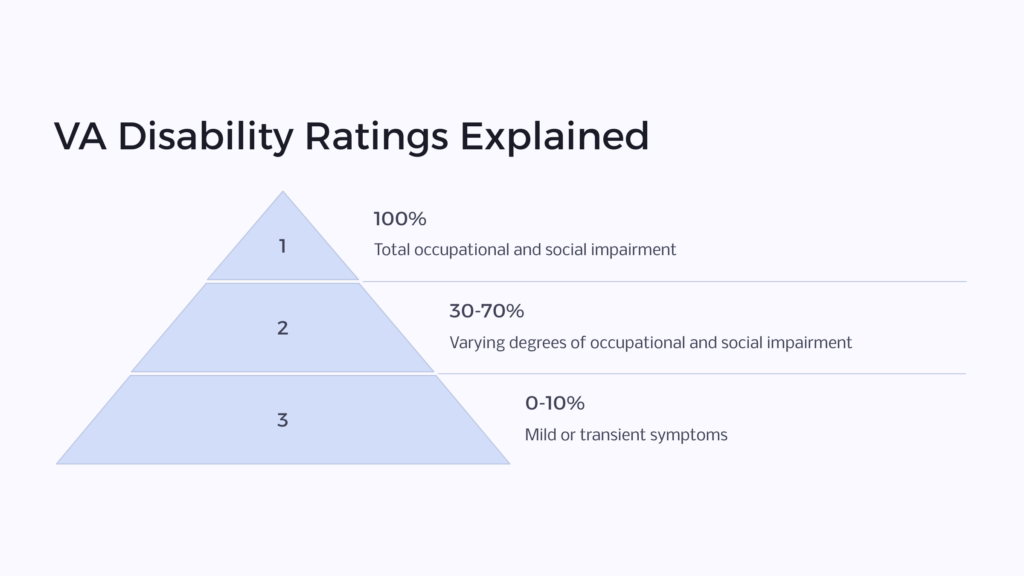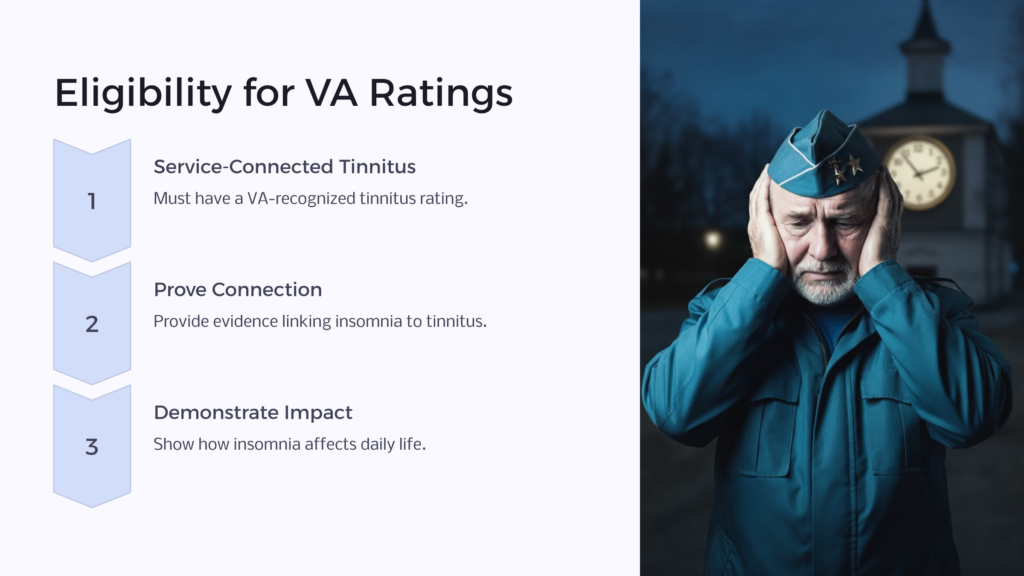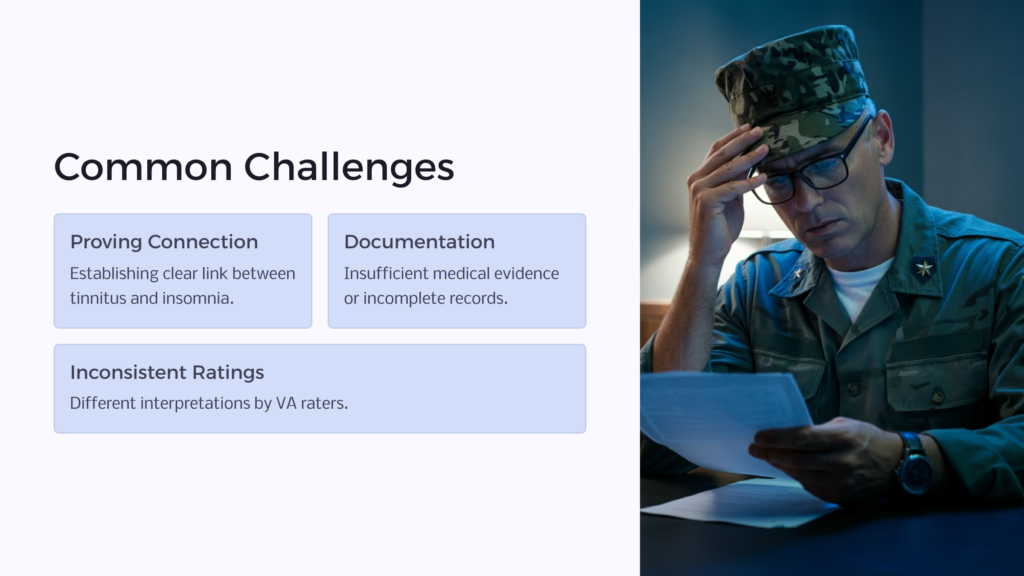
Tinnitus is a medical condition that affects many veterans, characterized by ringing, buzzing, or whistling sounds in the ears that are not caused by external sources. For veterans, tinnitus often results from loud noise exposure and subsequent damage to the inner ear during military service, most often from gunfire, explosions, or aircraft engines, or it may appear as a result of traumatic brain injury (TBI). This persistent noise can be more than just an annoyance – it can significantly impact daily life and overall well-being.
Veterans with tinnitus may experience difficulty concentrating, trouble sleeping, and increased stress levels. These effects can lead to other health issues, including anxiety, depression, and, notably, insomnia. The constant noise in their ears can make it challenging to relax and fall asleep, leading to a cycle of sleep deprivation and daytime fatigue.
The Department of Veterans Affairs (VA) recognizes chronic tinnitus as a service-connected disability, meaning veterans can receive VA disability benefits for this condition if it’s linked to their military service. Understanding how tinnitus affects veterans is crucial for both the veterans themselves and the VA in addressing secondary conditions like insomnia. In this post, we’ll delve into the details of claiming insomnia as a secondary condition to tinnitus so you can navigate the VA disability claims process with ease and get the benefits you deserve.
Understanding Insomnia as a Secondary Condition
Insomnia, a sleep disorder characterized by difficulty falling asleep, staying asleep, or both, can often develop as a secondary condition to tinnitus. When insomnia occurs as a result of another service-connected disability like tinnitus, it’s referred to as a “secondary condition” by the VA.
For many veterans with tinnitus, the constant ringing or buzzing in their ears can make it nearly impossible to fall asleep or stay asleep through the night. This can lead to experiencing chronic insomnia directly related to their service-connected tinnitus. The relationship between tinnitus and insomnia is well-documented, with many veterans reporting that their sleep problems began or worsened after developing tinnitus.
It’s important to note that insomnia secondary to tinnitus is not just about having trouble sleeping. It can lead to a host of other issues, including daytime fatigue, mood changes, decreased performance at work, and even physical and mental health problems. For veterans, these effects can be particularly challenging, impacting their ability to transition to civilian life or maintain employment.
VA Disability Ratings: What You Need to Know

VA disability ratings are a crucial part of the disability benefits and compensation system for veterans. These ratings determine the level of compensation a veteran receives for service-connected disabilities. Understanding how VA ratings work is essential for veterans seeking benefits for conditions like insomnia secondary to tinnitus.
VA disability ratings are expressed as percentages, ranging from 0% to 100%, in increments of 10%. A higher percentage indicates a more severe disability and results in higher compensation. For conditions like insomnia, which is often rated as part of a mental health condition, the VA uses a General Rating Formula for Mental Disorders.
It’s important to note that while tinnitus itself has a maximum rating of 10%, secondary conditions like insomnia can receive their own separate ratings. This means that a veteran with tinnitus and related insomnia could potentially receive compensation for both conditions, increasing their overall disability rating and compensation.
The VA takes into account how the disability affects a veteran’s ability to work and perform daily activities when assigning ratings. For insomnia, factors such as the frequency and severity of sleep disturbances, impact on daytime functioning, and any associated mental health symptoms are considered.
How Insomnia and Tinnitus Are Related
The relationship between insomnia and tinnitus is complex and often bidirectional. Tinnitus can cause or exacerbate insomnia, while lack of sleep can make tinnitus symptoms more noticeable and distressing. This connection is crucial in understanding why the VA recognizes insomnia as a potential secondary condition to tinnitus.
Tinnitus often becomes more noticeable in quiet environments, such as when trying to fall asleep. The constant noise can make it difficult for veterans to relax and drift off to sleep. Additionally, anxiety about not being able to sleep due to tinnitus can create a cycle of stress and sleeplessness, further worsening the insomnia.
Studies have shown that a significant percentage of individuals with tinnitus also experience sleep disturbances. For example, a study cited in a VA appeal case noted that tinnitus patients often report difficulty falling asleep and staying asleep throughout the night. This evidence further supports the connection between tinnitus and insomnia, reinforcing the basis for insomnia as a secondary condition VA disability claim.
It’s also worth noting that poor sleep can also heighten sensitivity to tinnitus during waking hours. This creates a vicious cycle where tinnitus causes sleep problems, and lack of sleep makes tinnitus even more aggravating, potentially leading to increased anxiety and depression.
Eligibility for VA Ratings for Insomnia Secondary to Tinnitus

To be eligible for a VA rating for insomnia secondary to tinnitus, veterans must meet certain criteria. First and foremost, you must have a service-connected rating for tinnitus. This means that your tinnitus has been recognized by the VA as being related to your military service.
Next, you must provide evidence that your insomnia is directly caused or worsened by your service-connected tinnitus. This typically requires medical evidence, such as a doctor’s opinion or medical records, that establishes a clear link between the two conditions.
You should also be able to demonstrate that their insomnia causes significant impairment in their daily life. This could include evidence of how sleep disturbances affect their work performance, relationships, or overall quality of life.
It’s important to note that the process of proving a secondary connection can be complex. You may need to provide detailed sleep logs, undergo sleep studies, or get statements from family members or coworkers who can attest to the impact of their sleep issues. Resources like Veterans Disability Info can provide valuable guidance on gathering the necessary evidence for a claim.
VA’s General Disability Rating Formula for Sleep Disorders
The VA uses a General Rating Formula for Mental Disorders to evaluate sleep disorders, including insomnia. This formula provides a framework for assigning disability ratings based on the severity of symptoms and their impact on a veteran’s life.
Here’s a simplified breakdown of the rating scale:
- 0%: A diagnosis of insomnia exists, but symptoms are not severe enough to interfere with work or social functioning.
- 10%: Mild or transient symptoms that decrease work efficiency during periods of significant stress.
- 30%: Occasional decrease in work efficiency with intermittent periods of inability to perform tasks.
- 50%: Reduced reliability and productivity due to symptoms such as sleep disturbance, anxiety, and mood changes.
- 70%: Deficiencies in most areas, such as work, school, family relations, judgment, thinking, or mood.
- 100%: Total occupational and social impairment due to severe symptoms.
It’s important to understand that insomnia secondary to tinnitus may be rated as part of an overall mental health condition if other symptoms are present. The VA will consider the entire disability picture when assigning a rating.
Veterans should also be aware that the VA may use sleep studies or other medical evidence to support the rating decision. Keeping detailed records of sleep patterns, medication use, and the impact of insomnia on daily life can be incredibly helpful in the rating process.
Case Studies: Veterans’ Experiences with Insomnia and Tinnitus
Real-life examples can help illustrate how the VA handles claims for insomnia secondary to tinnitus. Here are a few anonymized case studies:
- Veteran A: Served in Iraq and developed tinnitus after exposure to explosions. He later developed severe insomnia, unable to sleep more than 2-3 hours per night due to the constant ringing in his ears. The VA awarded him a 10% rating for tinnitus and a separate 30% rating for insomnia, recognizing it as a secondary condition.
- Veteran B: A former Navy sailor who worked near jet engines, developed tinnitus and mild insomnia. Initially, she received a 10% rating for tinnitus. After her sleep issues worsened over time, she filed a secondary claim and received an additional 10% rating for insomnia.
- Veteran C: An Army veteran with severe tinnitus and related insomnia, depression, and anxiety. The VA evaluated his conditions together under the mental health criteria, awarding a 70% rating for the combined impact of these issues on his daily functioning.
These cases demonstrate the variability in how the VA may rate insomnia secondary to tinnitus, depending on the severity of symptoms and their overall impact on your life. As seen above, some veterans have successfully claimed multiple conditions secondary to tinnitus, resulting in higher overall ratings.
How to Apply for VA Disability for Insomnia Secondary to Tinnitus
Applying for VA disability for insomnia secondary to tinnitus involves several steps:
- Gather evidence: Collect medical records, sleep study results, and any documentation of how insomnia affects your daily life. A sleep journal can be particularly helpful.
- Get a medical opinion: Obtain a statement from a doctor linking your insomnia to your service-connected tinnitus. This “nexus letter” is crucial for establishing the secondary connection.
- File the claim: Submit VA Form 21-526EZ: Application for Disability Compensation and Related Compensation Benefits. Clearly indicate that you’re claiming insomnia as secondary to tinnitus.
- Attend C&P Exam: The VA may schedule a Compensation and Pension examination to assess the severity of your insomnia and its connection to tinnitus.
- Wait for a decision: The VA will review your claim and supporting evidence before making a decision.
Remember to be thorough and honest throughout the process. Providing clear, detailed information about how insomnia affects your life can strengthen your claim. You can also seek out additional resources who can help offer guidance on navigating the application process and understanding secondary conditions.
Common Challenges in Securing VA Ratings

Veterans often face several challenges when seeking VA ratings for insomnia secondary to tinnitus:
- Proving the connection: Establishing a clear link between tinnitus and insomnia can be difficult. The VA may argue that other factors are causing the sleep issues.
- Inconsistent ratings: Different VA raters may interpret the same evidence differently, leading to inconsistent ratings for similar cases.
- Underestimating severity: Veterans may downplay their symptoms, resulting in lower ratings that don’t accurately reflect their disability.
- Lack of documentation: Insufficient medical evidence or incomplete records can weaken a claim.
- Complex rating criteria: The VA’s rating system for mental health conditions, which includes insomnia, can be confusing and difficult to navigate.
To overcome these challenges, veterans should be proactive in documenting their symptoms, seeking regular medical care, and considering assistance from Veterans Service Organizations or experienced attorneys who specialize in VA disability claims.
Resources and Support for Veterans with Insomnia and Tinnitus
Veterans dealing with insomnia secondary to tinnitus have several resources available:
- VA Medical Centers: Offer sleep clinics and mental health services specifically for veterans.
- Veterans Service Organizations (VSOs): Organizations like the American Legion or Disabled American Veterans provide free assistance with VA claims.
- Online Communities: Websites like Veterans Benefits Network offer forums where veterans can share experiences and advice.
- Tinnitus Management Programs: Many VA facilities offer specialized programs to help manage tinnitus symptoms, which can also address related sleep issues.
- Mental Health Apps: The VA has developed mobile apps like CBT-i Coach to help veterans manage insomnia symptoms.
- Legal Aid: Some law firms specialize in veterans’ disability claims and can provide expert guidance through the claims process.
- Support Groups: Both in-person and online support groups can offer valuable peer support for veterans struggling with tinnitus and insomnia.
These resources can provide valuable support, information, and assistance in managing symptoms and navigating the VA system.
Expert Opinions on Managing Tinnitus and Insomnia
Medical experts and researchers have provided valuable insights into managing the combination of tinnitus and insomnia:
Dr. James Henry, a leading tinnitus researcher, emphasizes the importance of addressing the emotional response to tinnitus. He suggests that by reducing anxiety and stress related to tinnitus, sleep problems can often improve.
Sleep specialist Dr. Michael Grandner recommends cognitive behavioral therapy for insomnia (CBT-I) as a first-line treatment for veterans with tinnitus-related sleep issues. This approach helps change thoughts and behaviors that interfere with sleep.
Audiologist Dr. Caroline Pruski advocates for a holistic approach, combining sound therapy for tinnitus management with sleep hygiene practices and relaxation techniques to improve sleep quality.
These expert opinions highlight the importance of a multi-faceted approach to managing tinnitus and related insomnia. Veterans are encouraged to work with their healthcare providers to develop a comprehensive treatment plan that addresses both conditions.
Future Developments in VA Ratings for Sleep Disorders
The VA continually updates its policies and procedures based on new research and understanding of veterans’ health issues. Several developments may impact future VA ratings for sleep disorders, including insomnia secondary to tinnitus:
- Increased recognition of sleep disorders: As more research emerges on the impact of sleep disorders on overall health, the VA may refine its rating criteria to better reflect these findings.
- Improved diagnostic tools: Advancements in sleep study technology and home-based sleep monitoring may provide more accurate data for rating decisions.
- A holistic approach to rating: There’s a growing trend towards considering the combined impact of multiple service-connected conditions, which could benefit veterans with tinnitus and related insomnia.
- Emphasis on functional impact: Future rating systems may place greater emphasis on how sleep disorders affect a veteran’s daily functioning and quality of life.
- Integration of mental health and sleep disorder ratings: Given the close relationship between sleep disorders and mental health, the VA may develop more integrated rating systems for these conditions.
Veterans should stay informed about these potential changes and how they might affect their disability claims. Regularly checking VA updates and consulting with VSOs or legal experts can help veterans navigate any future changes in the rating system. Benefits.com is here to help veterans navigate the VA claims process for service-related disabilities. To learn more, take our Benefits Quiz and find other benefits you may qualify for.
 Benefits.com Advisors
Benefits.com Advisors
With expertise spanning local, state, and federal benefit programs, our team is dedicated to guiding individuals towards the perfect program tailored to their unique circumstances.
Rise to the top with Peak Benefits!
Join our Peak Benefits Newsletter for the latest news, resources, and offers on all things government benefits.




















